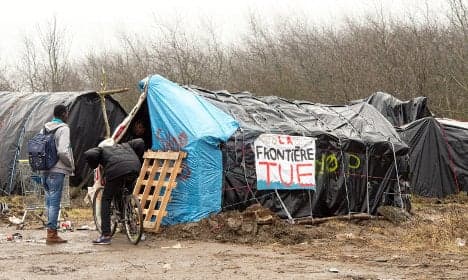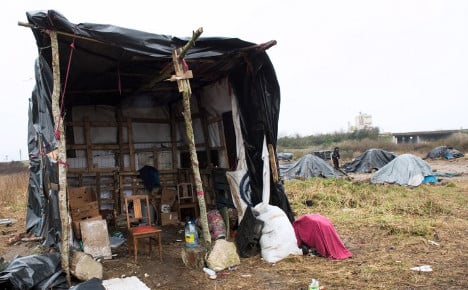New Calais migrant camp 'the worst in Europe'

After hundreds of migrants were forced to relocate their shanty town to another part of the northern French city of Calais, aid workers have slammed the new settlement as the "worst in Europe" for the refugees from war zones.
The flow of migrants to Calais has increased rapidly in recent years to the point where as many as 2,500 have amassed in makeshift shanty towns, the largest of which is known as "The Jungle".
Most of the migrants - who come mainly from Sudan, Eritrea, Afghanistan, Pakistan and Syria - have no intention of staying in France, and are more interested in looking for opportunities to cross the Channel and seek asylum in the UK.
Last week, French local authorities finally took action, saying The Jungle and all the smaller sites would be bulldozed by the end of the month.
Though it's nearly impossible to keep count of a population that's constantly shifting, an estimated 1,300 have had no choice but to leave. Now, around 1,200 have moved to one single designated wasteland to the east of the city on the back of eviction threats from the French riot police.
But aid workers have said that conditions at the new camp are far from acceptable.
"This is the worst camp for war refugees in Europe, if not in the world," Christian Salomé, the director of voluntary migrant help group L’Auberge des Migrants, told The Local on Friday.
"It is probably the only camp in the world where there is so little water. There is only one water point and some people have to walk more than a kilometre to access it. This is unacceptable. There are no toilets either."

(A hut at the camp known as "The New Jungle". Photo: AFP)
He added that his team brings material to help build the slum every day, but that the organization has had to keep putting pressure on French authorities for things as basic as water points and toilets.
"For the first time the migrants have an official piece of land - but it remains a slum," he said.
In the meantime, non-profit organization Doctors of the World has started to dig dry toilets, basically a hole in the ground.
The 18-hectare wasteland dubbed by the migrants as "The New Jungle" - tents and makeshift shelters covered by big, grey plastic canvas sheets have started to pop up.
Located on the seafront, a half an hour walk from the ferry terminals, five kilometres from the town hall, and far from any residential area, the new camp is situated in a marsh and is part of a flooding area.
In the camp, the Jules Ferry centre, a former holiday spot for children, has been converted into an emergency day centre. It accommodates 50 vulnerable women and children and from April 13th it will be equipped with warm showers.
During the day, the centre is open to everyone and every day at 5pm it serves 600 warm meals, just about enough to feed half of the camps’ population.
Meanwhile, the migrants have been forced to rebuild the mosque and church they once had at their old camp - buildings crudely put together with wooden boards, corrugated iron and anything they could find.
Volunteer Christian Salomé said it might take another few days to build the school again.
The old camp was built on the land of the Tioxide factory, one of Europe’s main producers of titanium dioxide. In July 2014, the firm was granted the legal right to ask for the eviction of the migrants. But until now, there was nowhere to send them.
Calais Mayor Natacha Bouchart hopes the move will help the local authorities to better control the fluctuating migrant population by establishing one official camp.
This is the first purpose-built camp for migrants since the 2002 closure of the Sangatte centre near Calais, which used to host about 1,500 migrants.
Both France and the UK are at loggerheads as to who is responsible for the migrants in Calais.
France's Interior Minister Bernard Cazeneuve suggested in November that the UK should send its own officials across the Channel to help block the tide of illegal migrants, but the idea was dismissed by Britain's government, which said it was "for the French to maintain security and public order on their own soil".
By Chloé Farand
Comments
See Also
The flow of migrants to Calais has increased rapidly in recent years to the point where as many as 2,500 have amassed in makeshift shanty towns, the largest of which is known as "The Jungle".
Most of the migrants - who come mainly from Sudan, Eritrea, Afghanistan, Pakistan and Syria - have no intention of staying in France, and are more interested in looking for opportunities to cross the Channel and seek asylum in the UK.
Last week, French local authorities finally took action, saying The Jungle and all the smaller sites would be bulldozed by the end of the month.
Though it's nearly impossible to keep count of a population that's constantly shifting, an estimated 1,300 have had no choice but to leave. Now, around 1,200 have moved to one single designated wasteland to the east of the city on the back of eviction threats from the French riot police.
But aid workers have said that conditions at the new camp are far from acceptable.
"This is the worst camp for war refugees in Europe, if not in the world," Christian Salomé, the director of voluntary migrant help group L’Auberge des Migrants, told The Local on Friday.
"It is probably the only camp in the world where there is so little water. There is only one water point and some people have to walk more than a kilometre to access it. This is unacceptable. There are no toilets either."

(A hut at the camp known as "The New Jungle". Photo: AFP)
He added that his team brings material to help build the slum every day, but that the organization has had to keep putting pressure on French authorities for things as basic as water points and toilets.
"For the first time the migrants have an official piece of land - but it remains a slum," he said.
In the meantime, non-profit organization Doctors of the World has started to dig dry toilets, basically a hole in the ground.
The 18-hectare wasteland dubbed by the migrants as "The New Jungle" - tents and makeshift shelters covered by big, grey plastic canvas sheets have started to pop up.
Located on the seafront, a half an hour walk from the ferry terminals, five kilometres from the town hall, and far from any residential area, the new camp is situated in a marsh and is part of a flooding area.
In the camp, the Jules Ferry centre, a former holiday spot for children, has been converted into an emergency day centre. It accommodates 50 vulnerable women and children and from April 13th it will be equipped with warm showers.
During the day, the centre is open to everyone and every day at 5pm it serves 600 warm meals, just about enough to feed half of the camps’ population.
Meanwhile, the migrants have been forced to rebuild the mosque and church they once had at their old camp - buildings crudely put together with wooden boards, corrugated iron and anything they could find.
Volunteer Christian Salomé said it might take another few days to build the school again.
The old camp was built on the land of the Tioxide factory, one of Europe’s main producers of titanium dioxide. In July 2014, the firm was granted the legal right to ask for the eviction of the migrants. But until now, there was nowhere to send them.
Calais Mayor Natacha Bouchart hopes the move will help the local authorities to better control the fluctuating migrant population by establishing one official camp.
This is the first purpose-built camp for migrants since the 2002 closure of the Sangatte centre near Calais, which used to host about 1,500 migrants.
Both France and the UK are at loggerheads as to who is responsible for the migrants in Calais.
France's Interior Minister Bernard Cazeneuve suggested in November that the UK should send its own officials across the Channel to help block the tide of illegal migrants, but the idea was dismissed by Britain's government, which said it was "for the French to maintain security and public order on their own soil".
By Chloé Farand
Join the conversation in our comments section below. Share your own views and experience and if you have a question or suggestion for our journalists then email us at [email protected].
Please keep comments civil, constructive and on topic – and make sure to read our terms of use before getting involved.
Please log in here to leave a comment.